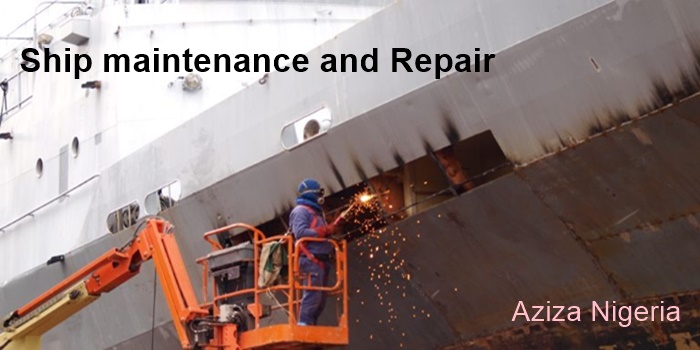Ship maintenance and repair is the process of keeping Ship in good working order through regular upkeep and necessary repairs. It’s important for ensuring that Ship is safe to use and that it’s operation can operate smoothly. Ship repair and maintenance requires proactive, planned maintenance. For On-site and On-voyage Ship maintenance and repair services, contact Aziza M.E.S Limited.
What is Ship Planned Maintenance?
Planned maintenance is the proactive scheduling and performing of important service procedures. Companies and operators with a well-designed maintenance plan will understand when future servicing will be required, what tools and parts will be needed, and how the job should be completed. In short, these plans are comprehensive how-to guides telling you what, when, and how to repair or service the vessel.
It also involves regularly inspecting a vessel’s key on-board systems and carrying out any necessary works to ensure these are kept in optimum working condition.
Read: NipeX Registration
Incorporating a planned maintenance schedule for your vessels can improve reliability, reduce running costs, and enhance crew safety, among other benefits. Let’s take a closer look to discover just why planned maintenance is a favored servicing approach in the maritime industry.
Advantages of Ship Maintenance and Repair
Ship planned maintenance and repair has many benefits/ advantages for the ship owners, the business partners and entire ecosystem. It’s also help ccommercial maritime vessels to comply with various international and national regulations, covering everything from safety to environmental protection. Complying with these standards is essential, and helps ship owners to:
Lower Your Operational Costs
Small issues can quickly snowball into much larger, costlier problems when not addressed. Hull cleaning, for instance, is a routine maintenance item that removes barnacles and other sea life from a ship’s bottom. When it is not done regularly, the resulting drag could lead to dramatically worse performance and fuel economy, which translates to higher fuel costs and, in the worst-case scenario, potential mechanical issues.
Read: Oil and Gas Permits & License in Nigeria
The net effects of these consequences will almost certainly cost more in outright repairs and downtime than regular hull cleaning. However, the point it illustrates is a universal truth: preventive maintenance is often the best insurance against unexpected downtime, which is not only frustrating but also expensive.
Avoid fines and penalties
Ship maintenance programmes should always include regular inspections and repairs of the on-board safety equipment and pollution control devices. By meeting national and international maritime safety authorities’ standards, ship owners can help avoid violations that could lead to fines, reputational damage, or suspension of operations.
Meet insurance requirements
Commercial vessels must have the relevant insurance in order to operate legally. Insurance companies will typically ask for proof that the ship is subject to regular and comprehensive maintenance processes before offering coverage or settling a claim.
Operational efficiency
Good ship repair and maintenance procedures include the regular inspection and repair of all on-board systems, such as propulsion, electrical, plumbing, and HVAC (Heating, Ventilation, and Air Conditioning) systems. Ensuring these are work at optimal levels helps to maximise a vessel’s operational efficiency by:
Reduce the Risk of Unexpected Repairs & Maintenance
Mechanically, boats and ships aren’t so different from cars and trucks – they all feature complex drivetrains and ancillary systems that are necessary for proper operation. And just as your car benefits from regular servicing intervals, the same is true with any vessel. Preventive maintenance ultimately reduces the likelihood of unexpected repairs, leading to less downtime, lower service costs and a host of other benefits.
Read: Local Content or NCDMB Certificate Registration
However, in the maritime industry, it’s almost a given that ship operators follow a preventive maintenance approach due to the expense, complexity, and danger of emergency offshore servicing. By establishing a plan for performing critical maintenance while docked, you’ll reduce both unnecessary downtime as well as risk to the crew, resulting in safer, lower-cost voyages.
Maintain necessary logs and records
Maritime regulations require ship owners to keep strict maintenance logs and records, which can be made available during safety inspections and audits. By keeping accurate records, ship owners are able to demonstrate their compliance with regulations and provide evidence of the maintenance that they have performed.
Reducing the chance of accidental pollution
Oil spills, discharging sewage, and other accidental pollution can cause significant ecological damage to marine habitats. Ensuring waste management treatment systems are well-maintained can help to avoid such issues.

